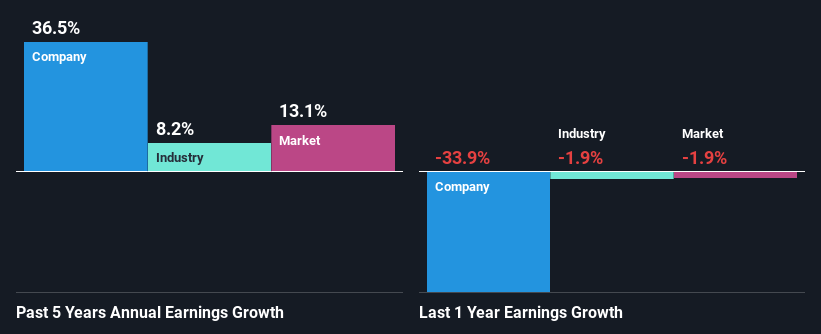Will Weakness in Bunge Global SA's (NYSE:BG) Stock Prove Temporary Given Strong Fundamentals?
Bunge Global (NYSE:BG) has had a rough three months with its share price down 15%. However, stock prices are usually driven by a company’s financial performance over the long term, which in this case looks quite promising. Particularly, we will be paying attention to Bunge Global's ROE today.
ROE or return on equity is a useful tool to assess how effectively a company can generate returns on the investment it received from its shareholders. Put another way, it reveals the company's success at turning shareholder investments into profits.
Check out our latest analysis for Bunge Global
How To Calculate Return On Equity?
The formula for return on equity is:
Return on Equity = Net Profit (from continuing operations) ÷ Shareholders' Equity
So, based on the above formula, the ROE for Bunge Global is:
13% = US$1.4b ÷ US$11b (Based on the trailing twelve months to June 2024).
The 'return' is the yearly profit. So, this means that for every $1 of its shareholder's investments, the company generates a profit of $0.13.
What Is The Relationship Between ROE And Earnings Growth?
Thus far, we have learned that ROE measures how efficiently a company is generating its profits. We now need to evaluate how much profit the company reinvests or "retains" for future growth which then gives us an idea about the growth potential of the company. Generally speaking, other things being equal, firms with a high return on equity and profit retention, have a higher growth rate than firms that don’t share these attributes.
Bunge Global's Earnings Growth And 13% ROE
To start with, Bunge Global's ROE looks acceptable. And on comparing with the industry, we found that the the average industry ROE is similar at 13%. This probably goes some way in explaining Bunge Global's significant 37% net income growth over the past five years amongst other factors. We believe that there might also be other aspects that are positively influencing the company's earnings growth. For example, it is possible that the company's management has made some good strategic decisions, or that the company has a low payout ratio.
As a next step, we compared Bunge Global's net income growth with the industry, and pleasingly, we found that the growth seen by the company is higher than the average industry growth of 8.2%.

The basis for attaching value to a company is, to a great extent, tied to its earnings growth. What investors need to determine next is if the expected earnings growth, or the lack of it, is already built into the share price. Doing so will help them establish if the stock's future looks promising or ominous. What is BG worth today? The intrinsic value infographic in our free research report helps visualize whether BG is currently mispriced by the market.
Is Bunge Global Efficiently Re-investing Its Profits?
Bunge Global's ' three-year median payout ratio is on the lower side at 19% implying that it is retaining a higher percentage (81%) of its profits. So it looks like Bunge Global is reinvesting profits heavily to grow its business, which shows in its earnings growth.
Besides, Bunge Global has been paying dividends for at least ten years or more. This shows that the company is committed to sharing profits with its shareholders. Our latest analyst data shows that the future payout ratio of the company is expected to rise to 29% over the next three years. Despite the higher expected payout ratio, the company's ROE is not expected to change by much.
Summary
Overall, we are quite pleased with Bunge Global's performance. In particular, it's great to see that the company is investing heavily into its business and along with a high rate of return, that has resulted in a sizeable growth in its earnings. That being so, a study of the latest analyst forecasts show that the company is expected to see a slowdown in its future earnings growth. Are these analysts expectations based on the broad expectations for the industry, or on the company's fundamentals? Click here to be taken to our analyst's forecasts page for the company.
Have feedback on this article? Concerned about the content? Get in touch with us directly. Alternatively, email editorial-team (at) simplywallst.com.
This article by Simply Wall St is general in nature. We provide commentary based on historical data and analyst forecasts only using an unbiased methodology and our articles are not intended to be financial advice. It does not constitute a recommendation to buy or sell any stock, and does not take account of your objectives, or your financial situation. We aim to bring you long-term focused analysis driven by fundamental data. Note that our analysis may not factor in the latest price-sensitive company announcements or qualitative material. Simply Wall St has no position in any stocks mentioned.
 Index Options
Index Options CME Group
CME Group Nasdaq
Nasdaq Cboe
Cboe TradingView
TradingView Wall Street Journal
Wall Street Journal